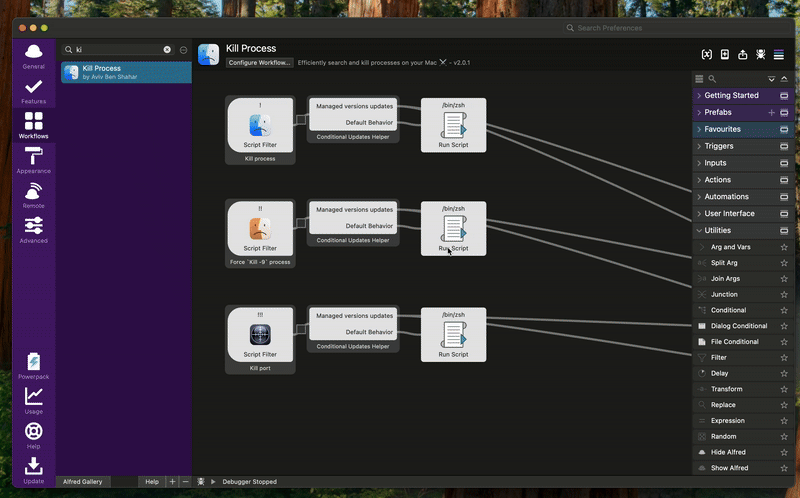Automated Workflow Updates 🔄
Experimental ⚠️
This feature is new and subject to change. Please use with caution and report any issues.
fast-alfred can automatically inject update-handling logic into your workflow at build time. This provides a seamless way for your users to keep the workflow up-to-date without any manual intervention.
The process is reversible and preserves all your existing workflow connections, including those with modifier keys.
DEMO

Build-Time Configuration
To enable the feature, change the configuration file .fast-alfred.config.cjs at the root of your project to include updates.
This instructs the bundler to inject the necessary helper objects into the workflow.
/**
* @type {import('fast-alfred').FastAlfredConfig}ı
*/
module.exports = {
updates: {
bundleHelpers: true, // Enable the injection of update helpers
exclude: ['esbuild/excluded-script'], // Optional, exclude specific scripts from this feature
userConfiguration: {
checkUpdatesCheckbox: true, // Optional, add a user-facing checkbox to enable/disable updates
},
},
}bundleHelpers: Set totrueto enable the injection.exclude: An array of script paths to exclude from this feature.userConfiguration: An object to configure user-facing settings.checkUpdatesCheckbox: Set totrueto add a checkbox in the workflow's configuration sheet that allows users to enable or disable automatic update checks.
Runtime Configuration
After enabling the helpers, configure their behavior in your client-side script using the alfredClient.updates() method.
import { FastAlfred, gitHubMonoRepoFetcher } from 'fast-alfred'
const alfredClient = new FastAlfred()
alfredClient.updates({
fetcher: gitHubMonoRepoFetcher({
owner: 'your-github-username',
repo: 'your-repo-name',
/**
* The #1 group catches the release version from the GitHub Releases
* should match your package.json version.
*/
releasePattern: /release\/my-workflow-name\/(.*)/, // Regex to match the release version
autoInstall: true, // Automatically install the update when available
}),
checkInterval: 60 * 5, // Optional, Check for updates every 5 hours - default is 1 day
snoozeTime: 60 * 24, // Optional, Snooze updates for 1 day - default is 3 day
})Important
You should call the alfredClient.updates() method in every production script filter where you want the update check to be triggered. Fast Alfred's internal caching (checkInterval) ensures that it won't check for updates on every single execution, but only when the interval has passed.
Fast Alfred provides two predefined fetchers, gitHubPolyRepoFetcher and gitHubMonoRepoFetcher, which can be imported directly from the package.
Custom Fetchers ✨
You are not limited to the predefined fetchers. You can provide your own custom fetcher function, as long as it conforms to the required Fetcher interface. This allows you to fetch updates from any source, such as a private server or a different Git provider.
Local Development
Debugger Behavior
Note that the snooze functionality (snoozeTime) is automatically bypassed when Alfred's debugger is open. This allows you to test the update logic without being blocked by the snooze period.
For a cleaner local development experience, you can remove all injected helpers by running:
npx fast-alfred --drop-update-helpers